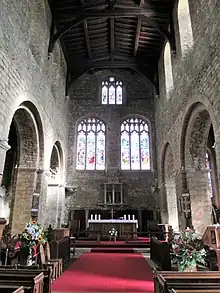Humphrey Radcliffe
Humphrey Radcliffe (died 1566) was an English landowner and Member of Parliament.

He was a son of Robert Radcliffe, 1st Earl of Sussex and Elizabeth, a daughter of Henry Stafford, 2nd Duke of Buckingham.
Radcliffe was a Member of Parliament for Bedfordshire and for Maldon in 1558 jointly with Roger Appleton.[1]
Radcliffe, as Lieutenant of the Gentlemen Pensioners, is said to have spoken in favour of the Protestant writer Edward Underhill shortly before the wedding of Mary I of England and Philip II of Spain, and so Underhill was allowed to serve at the feast at Wolvesey Castle.[2]
Radcliffe obtained the manor of Elstow in Bedfordshire, a former convent, from his wife's family, it had been granted to her father at the dissolution of the monasteries. He died on 30 August 1566.[3] There is a monument at Elstow, set over the altar.[4]
Marriage and children
Humphrey Radcliffe married Isabel or Elizabeth Harvey (died 1594), daughter and heir of Edmund Harvey of Elstow. There is a somewhat fictionalised 19th-century account of their meeting at a tournament.[5] Their children included:
- Thomas Radcliffe (died 1586)
- Edward Radcliffe (died 1643), who became Earl of Sussex in 1629.
- Mary Radcliffe (died 1617), a lady of the Privy Chamber of Elizabeth I and keeper of her jewels. Humphrey Radcliffe "presented" her to Elizabeth on 1 January 1561 as if she were a New Year's Day gift.[6]
- Elizabeth Radcliffe, who married Henry Owen of Wotton, Surrey, a descendent of Owen Tudor.[7]
- Martha Radcliffe, who married William Gostwick of Willington.
- Frances Radcliffe, who married Henry Cheke (died 1586), Secretary to the Council of the North.
References
- 'RADCLIFFE, Sir Humphrey (c.1509-66), of Elstow', The History of Parliament: the House of Commons 1558-1603, ed. P.W. Hasler, 1981
- Stephen Hyde Cassan, The Lives of the Bishops of Winchester, vol. 1 (London, 1827), p. 505.
- 'RADCLIFFE, Sir Humphrey (c.1509-66), of Elstow', The History of Parliament: the House of Commons 1558-1603, ed. P.W. Hasler, 1981
- Spencer Robert Wigram & M. J. Buckley, Chronicles of the Abbey of Elstow (Oxford, 1885), pp. 178-180.
- Edward Walford, Chapters from Family Chests, vol. 1 (London, 1887), pp. 258-267.
- Patricia Fumerton, Cultural Aesthetics: Renaissance Literature and the Practice of Social Ornament (Chicago, 1991), p. 43: Tracy Borman, Elizabeth's Women: The Hidden Story of the Virgin Queen (Jonathan Cape, 2009), p. 277.
- Edward Wedlake Brayley, John Britton, Edward William Brayley, Topographical History of Surrey, vol. 5 (London, 1850), p. 20.